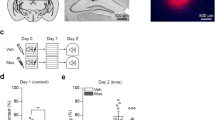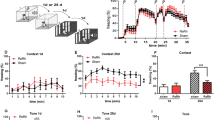Abstract
Rationale
Contextual fear memory depends on the hippocampus, but the role of unilateral hippocampus in this type of memory remains unclear.
Objectives
Herein, pharmacological inactivation or excitotoxic lesions were used to study the role of unilateral hippocampus in the stages of contextual fear memory.
Results
The pharmacological experiments revealed that compared with the control groups, unilateral hippocampal blockade did not impair 1-day recent memory following learning, whereas bilateral hippocampal blockade significantly impaired this memory. The lesion experiments showed that compared with the control groups, the formed contextual fear memory was retained for 7 days and that 30-day remote memory was markedly reduced in unilateral hippocampal lesion groups.
Conclusions
These results indicate that an intact bilateral hippocampus is required for the formation of remote memory and that unilateral hippocampus is sufficient for recent contextual fear memory.





Similar content being viewed by others
References
Anagnostaras SG, Gale GD, Fanselow MS (2001) Hippocampus and contextual fear conditioning: recent controversies and advances. Hippocampus 11:8–17
Anagnostaras SG, Maren S, Fanselow MS (1999) Temporally graded retrograde amnesia of contextual fear after hippocampal damage in rats: within-subjects examination. J Neurosci 19:1106–1114
Cimadevilla JM, Mendez M, Mendez-Lopez M, Arias JL (2007) Unilateral hippocampal blockade reveals that one hippocampus is sufficient for learning a passive avoidance task. J Neurosci Res 85:1138–1142
Debiec J, LeDoux JE, Nader K (2002) Cellular and systems reconsolidation in the hippocampus. Neuron 36:527–538
den Heijer T, van der Lijn F, Koudstaal PJ, Hofman A, van der Lugt A, Krestin GP, Niessen WJ, Breteler MM (2010) A 10-year follow-up of hippocampal volume on magnetic resonance imaging in early dementia and cognitive decline. Brain J Neurol 133:1163–1172
Dudai Y (2004) The neurobiology of consolidations, or, how stable is the engram? Annu Rev Psychol 55:51–86
Fanselow MS (2010) From contextual fear to a dynamic view of memory systems. Trends Cogn Sci 14:7–15
Flavell CR, Lee JL (2012) Post-training unilateral amygdala lesions selectively impair contextual fear memories. Learn Mem 19:256–263
Frankland PW, Bontempi B (2005) The organization of recent and remote memories. Nat Rev Neurosci 6:119–130
Gafford GM, Parsons RG, Helmstetter FJ (2011) Consolidation and reconsolidation of contextual fear memory requires mammalian target of rapamycin-dependent translation in the dorsal hippocampus. Neuroscience 182:98–104
Kim JJ, Fanselow MS (1992) Modality-specific retrograde amnesia of fear. Science 256:675–677
Maren S, Aharonov G, Fanselow MS (1997) Neurotoxic lesions of the dorsal hippocampus and Pavlovian fear conditioning in rats. Behav Brain Res 88:261–274
Maren S, Phan KL, Liberzon I (2013) The contextual brain: implications for fear conditioning, extinction and psychopathology. Nat Rev Neurosci 14:417–428
Matus-Amat P, Higgins EA, Barrientos RM, Rudy JW (2004) The role of the dorsal hippocampus in the acquisition and retrieval of context memory representations. J Neurosci 24:2431–2439
Nedelska Z, Andel R, Laczo J, Vlcek K, Horinek D, Lisy J, Sheardova K, Bures J, Hort J (2012) Spatial navigation impairment is proportional to right hippocampal volume. Proc Natl Acad Sci U S A 109:2590–2594
Rajasethupathy P, Sankaran S, Marshel JH, Kim CK, Ferenczi E, Lee SY, Berndt A, Ramakrishnan C, Jaffe A, Lo M, Liston C, Deisseroth K (2015) Projections from neocortex mediate top-down control of memory retrieval. Nature 526:653–659
Remaud J, Ceccom J, Carponcy J, Dugue L, Menchon G, Pech S, Halley H, Frances B, Dahan L (2014) Anisomycin injection in area CA3 of the hippocampus impairs both short-term and long-term memories of contextual fear. Learn Mem 21:311–315
Restivo L, Vetere G, Bontempi B, Ammassari-Teule M (2009) The formation of recent and remote memory is associated with time-dependent formation of dendritic spines in the hippocampus and anterior cingulate cortex. J Neurosci 29:8206–8214
Richmond MA, Yee BK, Pouzet B, Veenman L, Rawlins JN, Feldon J, Bannerman DM (1999) Dissociating context and space within the hippocampus: effects of complete, dorsal, and ventral excitotoxic hippocampal lesions on conditioned freezing and spatial learning. Behav Neurosci 113:1189–1203
Rudy JW, Barrientos RM, O’Reilly RC (2002) Hippocampal formation supports conditioning to memory of a context. Behav Neurosci 116:530–538
Ryan TJ, Roy DS, Pignatelli M, Arons A, Tonegawa S (2015) Memory. Engram cells retain memory under retrograde amnesia. Science 348:1007–1013
Schmidt CS, Lassonde M, Gagnon L, Sauerwein CH, Carmant L, Major P, Paquette N, Lepore F, Gallagher A (2015) Neuropsychological functioning in children with temporal lobe epilepsy and hippocampal atrophy without mesial temporal sclerosis: a distinct clinical entity? Epilepsy Behavior: E&B 44:17–22
Shimizu E, Tang YP, Rampon C, Tsien JZ (2000) NMDA receptor-dependent synaptic reinforcement as a crucial process for memory consolidation. Science 290:1170–1174
Shipton OA, El-Gaby M, Apergis-Schoute J, Deisseroth K, Bannerman DM, Paulsen O, Kohl MM (2014) Left-right dissociation of hippocampal memory processes in mice. Proc Natl Acad Sci U S A 111:15238–15243
Stepan-Buksakowska I, Szabo N, Horinek D, Toth E, Hort J, Warner J, Charvat F, Vecsei L, Rocek M, Kincses ZT (2014) Cortical and subcortical atrophy in Alzheimer disease: parallel atrophy of thalamus and hippocampus. Alzheimer Dis Assoc Disord 28:65–72
Ward MT, Oler JA, Markus EJ (1999) Hippocampal dysfunction during aging I: deficits in memory consolidation. Neurobiol Aging 20:363–372
Wignall EL, Dickson JM, Vaughan P, Farrow TF, Wilkinson ID, Hunter MD, Woodruff PW (2004) Smaller hippocampal volume in patients with recent-onset posttraumatic stress disorder. Biol Psychiatry 56:832–836
Wiltgen BJ, Sanders MJ, Anagnostaras SG, Sage JR, Fanselow MS (2006) Context fear learning in the absence of the hippocampus. J Neurosci 26:5484–5491
Wiltgen BJ, Tanaka KZ (2013) Systems consolidation and the content of memory. Neurobiol Learn Mem 106:365–371
Xiong GJ, Yang Y, Wang LP, Xu L, Mao RR (2014) Maternal separation exaggerates spontaneous recovery of extinguished contextual fear in adult female rats. Behav Brain Res 269:75–80
Zelikowsky M, Bissiere S, Fanselow MS (2012) Contextual fear memories formed in the absence of the dorsal hippocampus decay across time. J Neurosci 32:3393–3397
Zhang J, Tan Q, Yin H, Zhang X, Huan Y, Tang L, Wang H, Xu J, Li L (2011) Decreased gray matter volume in the left hippocampus and bilateral calcarine cortex in coal mine flood disaster survivors with recent onset PTSD. Psychiatry Res 192:84–90
Zhou H, Yu CL, Wang LP, Yang YX, Mao RR, Zhou QX, Xu L (2015) NMDA and D1 receptors are involved in one-trial tolerance to the anxiolytic-like effects of diazepam in the elevated plus maze test in rats. Pharmacol Biochem Behav 135:40–45
Acknowledgments
This work was supported by the National Basic Research Program of China from the Ministry of Science and Technology of China (2013CB835103 to L.X.), the Strategic Priority Research Program of the Chinese Academy of Science (XDB02020002 to L.X.), the National Science Foundation of China (31371141 to Q.-X. Z.), and the Science and Technology Program of Yunnan Province (2013GA003 to L.X.).
Competing interests
The authors declare that they have no competing interests.
Author information
Authors and Affiliations
Corresponding authors
Rights and permissions
About this article
Cite this article
Zhou, H., Zhou, Q. & Xu, L. Unilateral hippocampal inactivation or lesion selectively impairs remote contextual fear memory. Psychopharmacology 233, 3639–3646 (2016). https://doi.org/10.1007/s00213-016-4394-7
Received:
Accepted:
Published:
Issue Date:
DOI: https://doi.org/10.1007/s00213-016-4394-7




